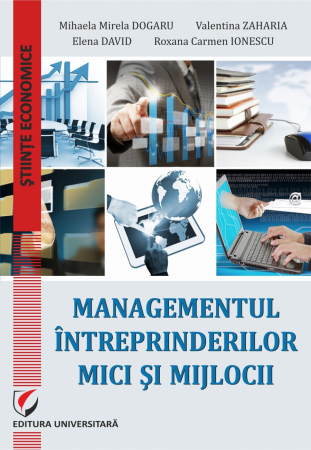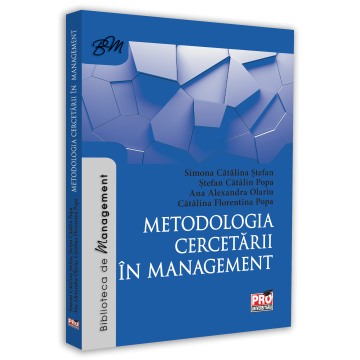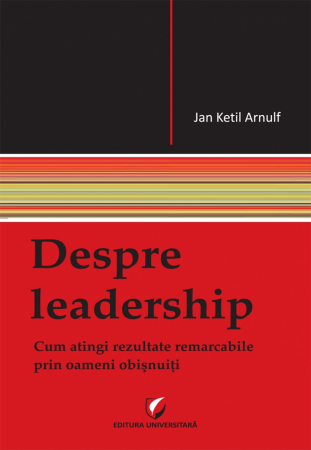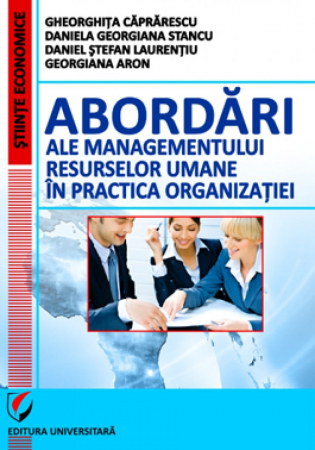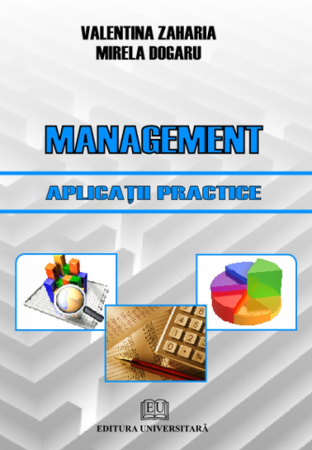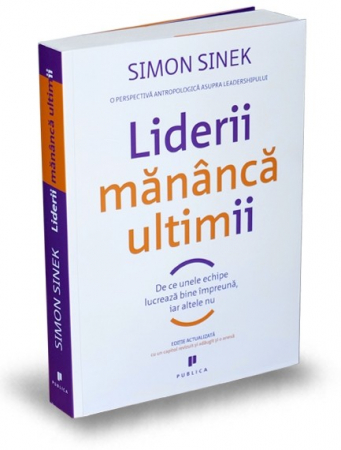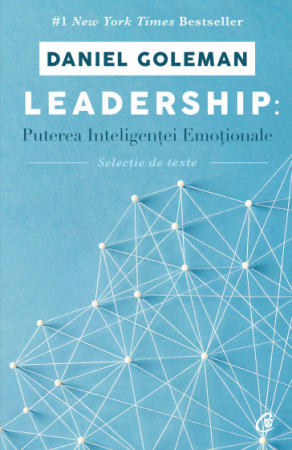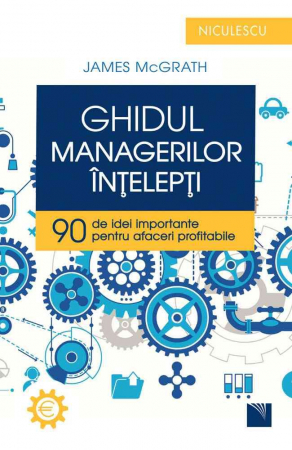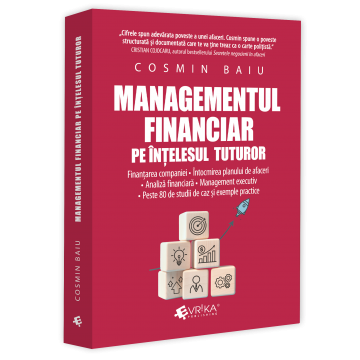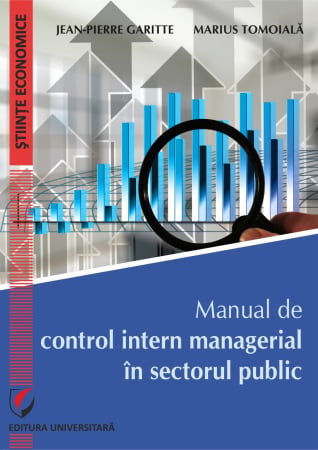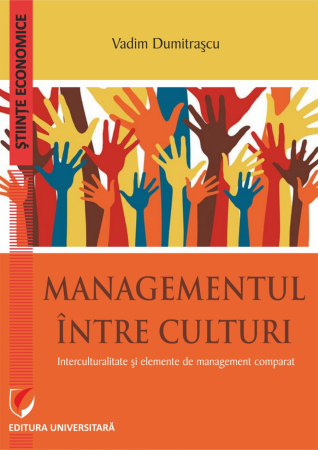Publisher: Editura Universitară
Author: Ion Verboncu
ISBN: 978-606-28-0775-7
DOI: 10.5682/9786062807757
Publisher year: 2018
Edition: I
Pages: 464
- Description
- Download (1)
- Authors
- More details
- Content
- Reviews (0)
Management is, indisputably, the most important success factor for organizations (public and private enterprises, public institutions) and the national economy of which they are part; its quality, efficiency and effectiveness are dependent on the quality of the human factor, with priority given to managers. A pertinent answer to the question that gives the title of the book can be given only in the situation where those who exercise management at the level of organizations and their components know management, ie master the managerial tools and methodologies for designing, redesigning and maintaining the system. management and its subsystems and are able to operationalize them, in conditions of efficiency and effectiveness, with the support of collaborators. The efficiency of the organization's management is, therefore, conditioned by the professionalization of managers through managerial methodology, continuous managerial training, improvement of human resources management, stability and coherence in the application of normative regulations.
-
CUM CONDUCEM? Intre amatorism si profesionalism
Download
Professor emeritus at the Academy of Economic Studies in Bucharest, he was born on July 11, 1953 in Tismana, Gorj County and is a graduate of the Faculty of Economics of Industry, Construction and Transport, as head of promotion, in 1976. He went through all university levels, from to assistant to university professor, to the Department of Management within the Faculty of Management. Since 2018 he is Doctor Honoris Causa of the Cooperative-Commercial University of Chisinau. The over four decades of university career have resulted in notable achievements in the field of scientific research (including research for education), teaching, professional and services to the academic community.
The scientific research has materialized in the publication of over 270 specialized articles, more than half of which are indexed by the Web of Science and BDI or in the volumes of international scientific events.
The didactic and professional activity includes numerous management books, as sole author (How do we lead? Between amateurism and professionalism; Managerial redesign of the organization; Management & managers; Do we know how to lead ?; Strategic management of public organizations) (Cum conducem? Intre amatorism si profesionalism; Reproiectarea manageriala a organizatiei; Management & manageri; Stim sa conducem?; Managementul strategic al organizatiilor publice s.a.), sole coordinator and main author ( Efficiency, effectiveness, performance; Public management; Management and performance, etc.) (Management. Eficienta, eficacitate, performante; Management public; Management si performante etc.), the second author (such as Fundamentals of organization management; Managerial methodologies) (Fundamentele managementului organizatiei; Metodologii manageriale), coordinator and author (Management dictionary; Modern approaches in economics and organization management, etc.) (Dictionar de management; Abordari moderne in economia si managementul organizatiei etc.) co-author in reference volumes for Romanian management (Company management strategies; Management systems, methods and techniques; Company decision-making system; Managers and human resources management; Contributions to the creation of a Romanian management model) (Strategii manageriale de firma; Sisteme, metode si tehnici de management; Sistemul decizional al firmei; Managerii si managementul resurselor umane; Contributii la crearea unui model romanesc de management s.a.)..
„CUM CONDUCEM? - Intre amatorism si profesionalism” este o carte ce se vrea un raspuns la problemele cu care se confrunta organizatiile romanesti, indeosebi intreprinderile publice si private, intr-un domeniu extrem de sensibil – managementul.
Experienta didactica, stiintifica si manageriala dobandita in peste patru decenii de activitate mi-a permis o analiza pertinenta a ceea ce se intampla, din punct de vedere managerial, in organizatiile din Romania, a conexiunilor acestora cu suprasistemele din care fac parte si cu mediul ambiant international, analiza ce a permis fundamentarea unor potentiale solutii de eficientizare manageriala, ce se inscriu in dorinta de a da un raspuns favorabil la doua intrebari: „Stim sa conducem?” si „Cum conducem?”.
Lucrarea se doreste un inventar succint al aspectelor teoretice ale managementului organizatiei, stiute sau necesar a fi stiute de cei care conduc si gestioneaza orice structura a societatii si economiei romanesti – de la minister la intreprindere – aceasta fiind prima conditie a unui raspuns pertinent la prima intrebare. In continuare, sunt evidentiate particularitatile celui mai important personaj implicat in exercitarea managementului, particularitati date de competenta profesionala si manageriala, de tipologia in care se inscrie fiecare, de stilul de management practicat, dar si maniera in care gestioneaza resursa cea mai pretioasa de care dispune, respectiv timpul. Cunostintele, calitatile si aptitudinile pe care le poseda, alaturi de maniera in care valorifica autoritatea conferita de posturile ocupate prin exercitarea proceselor de management contureaza portretul-robot al managerului profesionist, capabil de performante manageriale, generatoare de performante economico-financiare, comerciale etc. in domeniul condus. Profesionalizarea managerilor stagneaza din punct de vedere al performantelor inregistrate, in pofida existentei unor premise favorizante, precum existenta unei economii concurentiale, privatizarea managementului intreprinderilor publice, existenta unui puternic sector privat in economie s.a.m.d. De ce? Cauzele sunt multiple, insa cele mai importante se refera la metodologizarea manageriala veritabila redusa, la accentul la fel de redus pus pe competenta la recrutarea, selectia, angajarea si, mai ales, promovarea managerilor, la imixtiunea politicului in managementul intreprinderilor si institutiilor publice intr-o masura exagerata, la instabilitatea politica si legislativa.
Daca la intrebarea „Stim sa conducem?” raspunsul trebuie cautat in profesionalizarea managerilor si a managementului, la intrebarea „Cum conducem?” abordarea trebuie sa fie mai nuantata si sa ia in considerare particularitatile celor doua categorii de personaje dintr-o organizatie – managerii si executantii, precum si particularitatile constructive si functionale ale organizatiilor conduse si gestionate. Teoria managementului ofera rezolvari multiple la astfel de probleme, de la reengineeringul proceselor de afaceri la reengineeringul managementului, de la metodologizarea manageriala la ameliorarea culturii organizationale etc. insa, importante sunt cunoasterea continutului acestora si maniera de operationalizare, cu o pronuntata specificitate de la un tip de organizatie la altul. Am optat pentru unele modalitati de eficientizare manageriala legate strict de componenta metodologica a managementului din doua considerente: primul este dat de rolul fundamental al instrumentarului managerial si metodologiilor manageriale in scientizarea prestatiei managerilor, iar al doilea se refera la faptul ca operationalizarea acestor modalitati de metodologizare manageriala este foarte riguroasa, schematizata, axata pe o succesiune logica de secvente, etape si faze, cu care managerii organizatiilor – mai cu seama ai intreprinderilor – romanesti sunt familiarizati intrucat majoritatea dintre acestia au formatie tehnica. De aceea, cartea se adreseaza cu prioritate managerilor de IMM-uri, managerilor de intreprinderi publice si private, dar si celor care conduc institutii publice.
Pentru a deveni profesionisti in domeniu, trebuie sa indeplineasca un minimum de conditii:
- prima: sa stie management, cat mai mult management (sa posede cunostinte de management cat mai solide); argumentul conform caruia, inainte sau dupa ocuparea unui post de management, fac un curs postuniversitar de management de 1-2 saptamani si sunt apt pentru a-l exercita, nu sta in picioare! Managementul nu se invata in doua saptamani!
- a doua: sa aiba suficiente calitati si aptitudini manageriale care sa le completeze profilul managerial; arta trebuie imbinata cu stiinta, iar daca managerul este si un bun lider, atunci putem vorbi de un veritabil manager lider!
- a treia: postul de management sa ofere titularului o suficienta libertate decizionala si actionala, „terenul” propice de manifestare a cunostintelor, calitatilor si aptitudinilor manageriale si profesionale pe care acesta le poseda; corespondenta deplina intre autoritatea oficiala si autoritatea personala este cheia succesului oricarui manager!
- a patra: sa aiba suficiente cunostinte, calitati si aptitudini profesionale, in domeniul in care dispune de o pregatire medie sau superioara (tehnic, economic, juridic s.a.); tandemul competenta profesionala – competenta manageriala este valabil pentru orice post de management, cu precizarea ca ponderile celor doua dimensiuni variaza pe verticala managementului, in sensul ca pentru top management, prioritara este competenta manageriala, in timp ce, pentru managerii din esalonul inferior, prioritara este competenta profesionala.
Suntem constienti ca astazi, invadati de internet, apetitul pentru citit este din ce in ce mai scazut. Nici macar studentii nu mai au aceasta indeletnicire, desi ar trebui sa fie cei mai mari doritori de carte. Poate si din cauza altora care, caracterizati de incompetenta, au reusit in viata si, foarte curios, conduc si gestioneaza ministere si alte institutii ori intreprinderi ale statului in care, practic, conduc pe altii, mult mai competenti profesional si managerial! Cartea pe care o oferim celor care mai trec prin librarii sau se mai opresc pe la tarabele ce comercializeaza carti de specialitate se constituie intr-o modesta contributie la ameliorarea acestei situatii. Romania si romanii merita mai mult!
Nu pot incheia acest cuvant inainte fara a multumi familiei pentru sustinerea constanta in a publica carti in domeniul managementului si Editurii Universitare care, prin domnul director Vasile Muscalu, a dovedit inca o data, profesionalismul desavarsit in editarea de carte de specialitate.
Autorul
Bucuresti,
mai 2018
Foreword / 11
Part I - MANAGEMENT AND ORGANIZATION / 15
1. Terminological clarifications / 17
2. Management processes. Management functions (attributes) / 32
Forecasting - the most important function of management / 32
Organization - the most vulnerable of management functions / 34
Coordination - the most pleasant function / 37
Training - the most difficult to exercise / 38
Control-evaluation and conclusion of a managerial cycle / 39
Major dysfunctions in the exercise of management processes / 40
Management relations. Managerial principles / 41
Management science - scientific management / 42
3. Organization and environment / 44
What is the organization? / 44
Typology of organizations / 45
Systemic approach to the organization / 48
Environment, national and international / 50
The entrepreneur and the new business / 53
4. Management system / 56
Systemic approach to organization management / 56
Methodological component of management / 56
Managerial tools: typology and roles / 58
Managerial methodologies / 61
Characteristics of the methodological component of management / 61
The functions of the methodological component / 61
Decision component / 62
Brief considerations regarding the decision - making system / 62
Typology of managerial decisions / 63
Decision risks / 65
What functions does the decision-making component perform? / 67
Informational component / 68
What is the information system? / 68
The components of the information system and their typology / 68
The functions of the information component in management / 70
Organizational component / 70
Brief considerations regarding the organizational system / 70
Procedural organization / 71
Structural organization / 73
Unitary organization versus dualist organization / 74
Typology of organizational structures / 76
Organizational documents / 84
The functions of the organizational component / 85
Human resources management. Organizational culture / 85
What is "human resource management"? / 85
The functions of human resources management / 86
Organizational culture / 86
The functions of organizational culture / 87
Part II - DO WE KNOW HOW TO DRIVE? / 89
5. Managers and leaders / 91
Definition and competence of the manager / 91
Typology of managers and managerial styles. / 95
Time - the most important resource of the manager / 98
Ways to streamline the performance of managers / 100
The leader / 108
6. Professionalization of managers and management / 112
What is a professional manager? / 112
The stage of professionalization of managers and management / 114
Ways of professionalization of managers and management / 121
The impact of professionalism on the quality and efficiency of management / 133
Part III - HOW DO WE DRIVE? / 135
7. Managerial methodology. Approach / 137
Preliminary considerations / 137
Introduction to the universe of managerial methodology / 139
About the methodological component of management / 142
Models of managerial methodology / 145
8. Reengineering. From business process reengineering to management reengineering / 152
What is reengineering? / 152
From business process reengineering to management reengineering / 152
Managerial reengineering models / 160
Why don't Romanian companies in difficulty resort to reengineering? / 171
Organizational restructuring - brief considerations / 172
Restructuring versus managerial reengineering / 174
9. Diagnosis of the organization / 177
Introduction / 177
Definition and typology of diagnosis / 178
How do we develop a diagnostic study? / 180
SWOT analysis - methodological content / 192
Diagnosis versus SWOT analysis / 194
10. Strategy and strategic management / 198
What is the strategy? / 198
Components of the organization's strategy / 199
Typology of organizational strategies / 200
Characteristics of the strategy / 203
Determinants of the organization's strategy / 204
Correlative approach strategic management - strategic planning / 207
Strategic management methodology / 209
11. Procedural and structural-organizational redesign of the organization's management (processes and structures) / 226
Introduction / 226
Aspects regarding the dimensional and functional characteristics of the organizational system / 227
Analysis of the organizational system / 228
Procedural and structural-organizational redesign / 232
12. People (managers & executors) / 235
Redesigning human resources management / 236
Presentation of human resources management / 236
Human resources management analysis / 237
Redesigning human resources management / 238
Decisional redesign / 239
Premise / 239
Data and information regarding the decisional component / 243
Decision system analysis / 246
Decisional redesign / 247
Decision tools / 249
Redesigning the information component / 265
Part IV - QUALITY AND EFFICIENCY OF MANAGEMENT / 401
14. Particularities in determining the quality and efficiency of management403 Considerations about the quality and efficiency of management / 403
Quality of management / 407
Management efficiency. Managerial and economic performance / 415
How does managerial methodology influence the quality and efficiency of management? / 426
Impact on the exercise of management processes / 427
Impact on management quality and efficiency / 432
15. Reflections on management, for managers / 436
Bibliography / 457

6359.png)
![How do we drive? Between amateurism and professionalism - Ion Verboncu [1] How do we drive? Between amateurism and professionalism - Ion Verboncu [1]](https://gomagcdn.ro/domains/editurauniversitara.ro/files/product/large/cum-conducem-intre-amatorism-si-profesionalism-271-633369.jpg)
